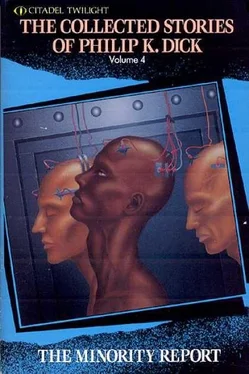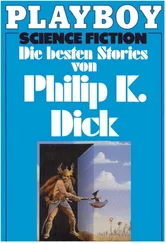"Oh, maybe an hour," the youth answered, as the car wandered lazily forward.
Tirol was afraid to ask the name of the planet. It would give him away. But he was consumed with the need to know. He might be two star-systems away or two million; he might be a month out of Earth or seventy years. Naturally, he had to get back; he had no intention of becoming a sharecropper on some backwater colony planet.
"Pretty swip," the youth said, indicating the torrent of noxious jazz pouring from the car radio. "That's Calamine Freddy and his Woolybear Creole Original Band. Know that tune?"
"No," Tirol muttered. The sun and dryness and heat made his head ache, and he wished to God he knew where he was.
The town was miserably tiny. The houses were dilapidated; the streets were dirt. A kind of domestic chicken roamed here and there, pecking in the rubbish. Under a porch a bluish quasi-dog lay sleeping. Perspiring and unhappy, Paul Tirol entered the bus station and located a schedule. A series of meaningless entries flashed by: names of towns. The name of the planet, of course, was not listed.
"What's the fare to the nearest port?" he asked the indolent official behind the ticket window.
The official considered. "Depends on what sort of port you want. Where you planning to go?"
"Toward Center," Tirol said. "Center" was the term used in out-systems for the Sol Group.
Dispassionately, the official shook his head. "No inter-system port around here."
Tirol was baffled. Evidently, he wasn't on the hub planet of this particular system. "Well," he said, "then the nearest interplan port."
The official consulted a vast reference book. "You want to go to which system-member?"
"Whichever one has the inter-system port," Tirol said patiently. He would leave from there.
"That would be Venus."
Astonished, Tirol said: "Then this system – " He broke off, chagrined, as he remembered. It was the parochial custom in many out-systems, especially those a long way out, to name their member planets after the original nine. This one was probably called "Mars" or "Jupiter" or "Earth," depending on its position in the group. "Fine," Tirol finished. "One-way ticket to – Venus."
Venus, or what passed for Venus, was a dismal orb no larger than an asteroid. A bleak cloud of metallic haze hung over it, obscuring the sun. Except for mining and smelting operations the planet was deserted. A few dreary shacks dotted the barren countryside. A perpetual wind blew, scattering debris and trash.
But the inter-system port was here, the field which linked the planet to its nearest star-neighbor and, ultimately, with the balance of the universe. At the moment a giant freighter was taking ore.
Tirol entered the ticket office. Spreading out most of his remaining money he said: "I want a one-way ticket taking me toward Center. As far as I can go."
The clerk calculated. "You care what class?"
"No," he said, mopping his forehead.
"How fast?"
"No."
The clerk said: "That'll carry you as far as the Betelgeuse System."
"Good enough," Tirol said, wondering what he did then. But at least he could contact his organization from there; he was already back in the charted universe. But now he was almost broke. He felt a prickle of icy fear, despite the heat.
The hub planet of the Betelgeuse System was called Plantagenet III. It was a thriving junction for passenger carriers transporting settlers to undeveloped colony planets. As soon as Tirol's ship landed he hurried across the field to the taxi stand.
"Take me to Tirol Enterprises," he instructed, praying there was an outlet here. There had to be, but it might be operating under a front name. Years ago he lost track of the particulars of his sprawling empire.
"Tirol Enterprises," the cab driver repeated thoughtfully. "Nope, no such outfit, mister."
Stunned, Tirol said: "Who does the slaving around here?"
The driver eyed him. He was a wizened, dried-up little man with glasses; he peered turtle-wise, without compassion. "Well," he said, "I've been told you can get carried out-system without papers. There's a shipping contractor… called -" He reflected. Tirol, trembling, handed him a last bill.
"The Reliable Export-Import," the driver said.
That was one of Lantano's fronts. In horror Tirol said: "And that's it?"
The driver nodded.
Dazed, Tirol moved away from the cab. The buildings of the field danced around him; he settled down on a bench to catch his breath. Under his coat his heart pounded unevenly. He tried to breathe, but his breath caught painfully in his throat. The bruise on his head where Ellen Ackers had hit him began to throb. It was true, and he was gradually beginning to understand and believe it. He was not going to get to Earth; he was going to spend the rest of his life here on this rural world, cut off from his organization and everything he had built up over the years.
And, he realized, as he sat struggling to breathe, the rest of his life was not going to be very long.
He thought about Heimie Rosenburg.
"Betrayed," he said, and coughed wrackingly. "You betrayed me. You hear that? Because of you I'm here. It's your fault; I never should have hired you."
He thought about Ellen Ackers. "You too," he gasped, coughing. Sitting on the bench he alternately coughed and gasped and thought about the people who had betrayed him. There were hundreds of them.
The living room of David Lantano's house was furnished in exquisite taste. Priceless late nineteenth century Blue Willow dishes lined the walls in a rack of wrought iron. At his antique yellow plastic and chrome table, David Lantano was eating dinner, and the spread of food amazed Beam even more than the house.
Lantano was in good humor and he ate with enthusiasm. His linen napkin was tucked under his chin and once, as he sipped coffee, he dribbled and belched. His brief period of confinement was over; he ate to make up for the ordeal.
He had been informed, first by his own apparatus and now by Beam, that banishment had successfully carried Tirol past the point of return. Tirol would not be coming back and for that Lantano was thankful. He felt expansive toward Beam; he wished Beam would have something to eat.
Moodily, Beam said: "It's nice here."
"You could have something like this," Lantano said.
On the wall hung a framed folio of ancient paper protected by helium-filled glass. It was the first printing of a poem of Ogden Nash, a collector's item that should have been in a museum. It aroused in Beam a mixed feeling of longing and aversion.
"Yes," Beam said. "I could have this." This, he thought, or Ellen Ackers or the job at Interior or perhaps all three at once. Edward Ackers had been retired on pension and he had given his wife a divorce. Lantano was out of jeopardy. Tirol had been banished. He wondered what he did want.
"You could go a long way," Lantano said sleepily.
"As far as Paul Tirol?"
Lantano chuckled and yawned.
"I wonder if he left any family," Beam said. "Any children." He was thinking about Heimie.
Lantano reached across the table toward the bowl of fruit. He selected a peach and carefully brushed it against the sleeve of his robe. "Try a peach," he said.
"No thanks," Beam said irritably.
Lantano examined the peach but he did not eat it. The peach was made of wax; the fruit in the bowl was imitation. He was not really as rich as he pretended, and many of the artifacts about the living room were fakes. Each time he offered fruit to a visitor he took a calculated risk. Returning the peach to the bowl he leaned back in his chair and sipped his coffee.
If Beam did not have plans, at least he had, and with Tirol gone the plans had a better than even chance of working out. He felt peaceful. Someday, he thought, and not too far off, the fruit in the bowl would be real.
Читать дальше










